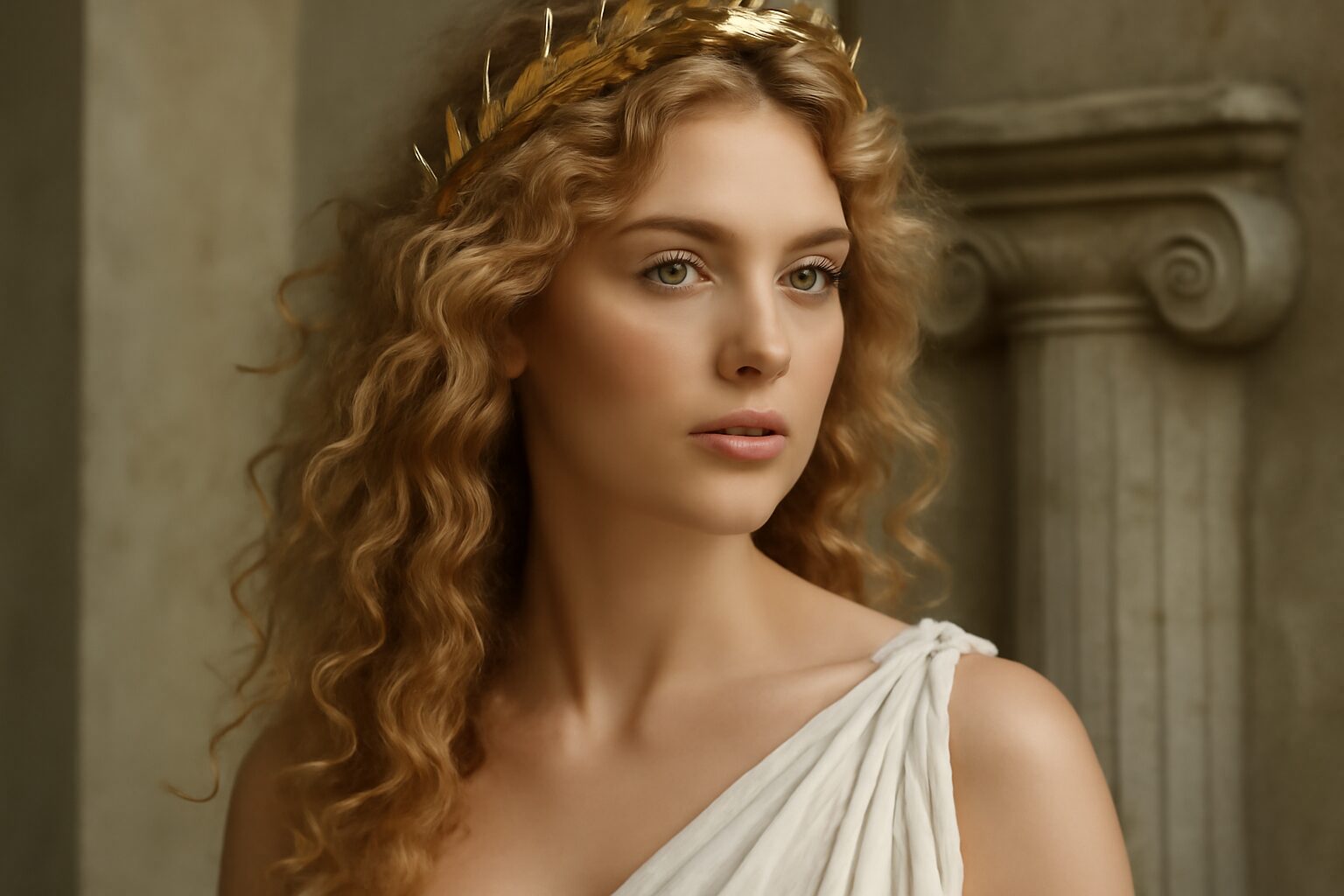Aphrodite: Goddess of Love and Beauty
In Greek mythology, Aphrodite reigns as the radiant goddess of love, beauty, pleasure, and procreation. Born from the sea foam near Cyprus—or, in some versions, as the daughter of Zeus and Dione—her very presence commanded adoration. Her name, derived from the Greek word aphros (foam), reflects her mythical origins, while her Roman counterpart, Venus, became synonymous with idealized love.
Powers and Symbols
Aphrodite’s divine influence extended far beyond mere physical allure. She wielded the power to inspire passion, desire, and even chaos among gods and mortals alike. Her legendary girdle, said to make its wearer irresistible, was a symbol of her unmatched charm. Often depicted with roses, doves, and myrtles, she embodied both the tender and tumultuous aspects of love. The swan and scallop shell were also sacred to her, reinforcing her connection to grace and the sea.
Myths and Legends
One of Aphrodite’s most famous myths involves the Judgment of Paris, where her promise of the most beautiful mortal woman, Helen of Troy, ignited the Trojan War. Her tumultuous marriage to Hephaestus, the god of blacksmiths, contrasted with her passionate affairs, notably with Ares, the god of war. Their union produced Eros (Cupid), the mischievous god of love, further cementing her legacy in the realm of desire.
Another tale highlights her vengeful side: when the mortal Psyche’s beauty rivaled her own, Aphrodite tormented her with impossible tasks—until Eros intervened, falling in love with Psyche himself.
Significance in Greek Culture
Aphrodite was more than a divine figure; she represented the Greeks’ complex understanding of love’s dual nature—both creative and destructive. Worshipped across the Mediterranean, her cults in Cyprus, Corinth, and Cythera celebrated her through festivals and temples. The Aphrodisia, held in her honor, emphasized fertility and union, reflecting her role in both personal and societal harmony.
Her influence endures in art, literature, and modern interpretations of love, proving that Aphrodite’s legacy is as timeless as the passions she governs.
Alternative Names for Aphrodite
God Name: Venus (Roman)
Venus is the Roman equivalent of Aphrodite, the goddess of love, beauty, and fertility. The Romans adopted many Greek deities, renaming them and integrating them into their own pantheon.
God Name: Aphrodite Kypris (Cypriot)
Aphrodite Kypris refers to her association with Cyprus, where she was believed to have risen from the sea. The epithet 'Kypris' highlights her connection to the island, a major center of her worship.
God Name: Aphrodite Ourania (Greek)
Aphrodite Ourania (Celestial Aphrodite) represents her aspect as a goddess of spiritual and heavenly love, as opposed to earthly or physical love. This distinction comes from Plato's Symposium.
God Name: Aphrodite Pandemos (Greek)
Aphrodite Pandemos (Common Aphrodite) symbolizes her role as the goddess of physical love and desire, accessible to all people. This epithet contrasts with Ourania and also originates from Plato's Symposium.
God Name: Aphrodite Areia (Greek)
Aphrodite Areia (Warlike Aphrodite) is a rare epithet linking her to war, particularly in Sparta. This reflects her occasional association with Ares and her role in martial contexts in certain regions.
God Name: Aphrodite Akraia (Greek)
Aphrodite Akraia refers to her worship in high places or promontories, such as the Acrocorinth. The epithet 'Akraia' signifies her connection to elevated sanctuaries.
Tales about Aphrodite
Aphrodite and Eros: The Birth of Desire
In the swirling foam of the sea, Aphrodite emerged fully formed, a vision of beauty and grace. As she stepped onto the shores of Cyprus, the very air seemed to shimmer with her presence. It was here that she first encountered Eros, the primordial god of love and desire, who had been drawn to her radiant energy.
The Divine Partnership
Recognizing a kindred spirit, Aphrodite embraced Eros not just as a companion, but as an essential part of her own domain. Together, they became an unstoppable force: Aphrodite embodying love's beauty and attraction, while Eros represented its irresistible, often chaotic, power. Their union gave rise to countless tales of passion and heartache among gods and mortals alike.
Wherever they went, flowers bloomed, hearts raced, and the world felt more alive—a testament to the enduring power of love in all its forms.
Aphrodite and Hephaestus: The Unlikely Union
To maintain peace among the gods, Zeus arranged a marriage between the breathtaking Aphrodite and the skilled but physically ungainly Hephaestus, god of the forge. Though initially reluctant, Aphrodite agreed, appreciating the stability and exquisite gifts—like a magical golden girdle—crafted by her new husband.
Beauty and the Smith
Despite Hephaestus's devotion, Aphrodite often found herself drawn to others, most notably Ares, the god of war. This tension between divine duty and personal desire became a legendary source of drama on Mount Olympus, showcasing Aphrodite's complex nature: both creator and disruptor of harmony.
Their marriage, though fraught with challenges, symbolized the unexpected alliances that shape destiny, blending artistry with allure in the tapestry of myth.
Frequently Asked Questions
Who is Aphrodite in Greek mythology?
Aphrodite is the Greek goddess of love, beauty, pleasure, and procreation. She is one of the twelve Olympian gods and is often depicted as incredibly beautiful, with myths describing her birth from sea foam.
Why is Aphrodite important in Greek mythology?
Aphrodite is important because she represents love and beauty, fundamental aspects of human life and culture. Her influence appears in many myths, affecting gods and mortals alike, often causing both harmony and conflict.
What are Aphrodite's symbols?
Aphrodite's symbols include the dove, rose, scallop shell, myrtle, and mirror. These items are associated with love, beauty, and the sea, reflecting her domains and origins.
How does Aphrodite's mythology apply today?
Aphrodite's themes of love, beauty, and desire remain relevant today, influencing art, literature, and modern discussions about relationships. Her stories also highlight timeless human experiences and emotions.
What can we learn from Aphrodite's stories?
Aphrodite's myths teach lessons about the power of love and beauty, as well as their potential to cause both joy and strife. They also explore themes of jealousy, passion, and the consequences of divine intervention in human affairs.













